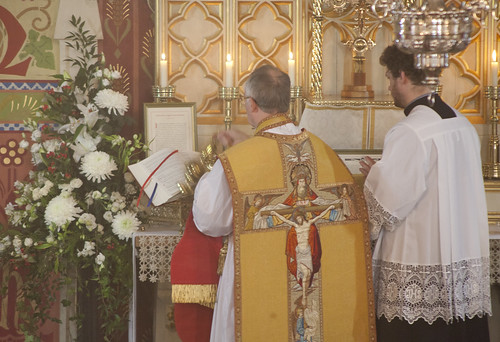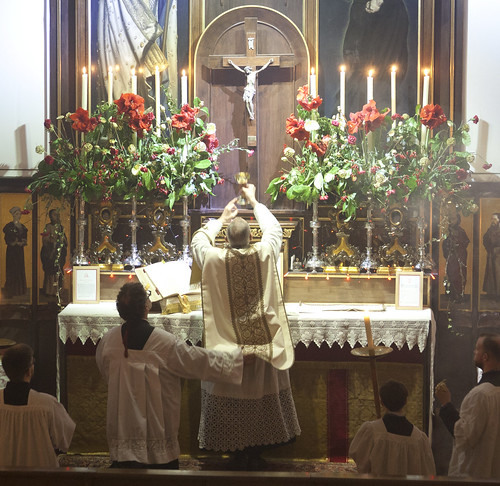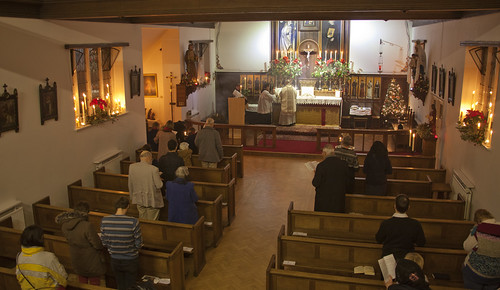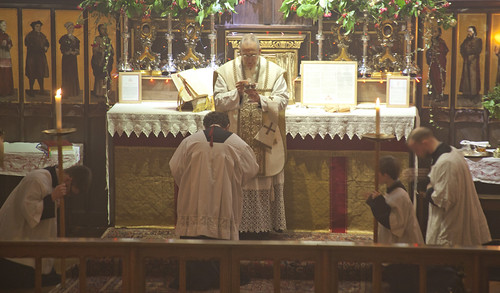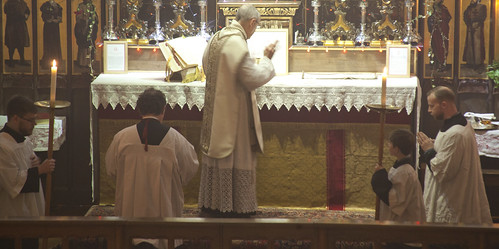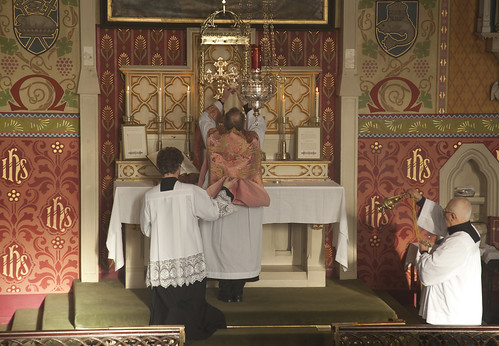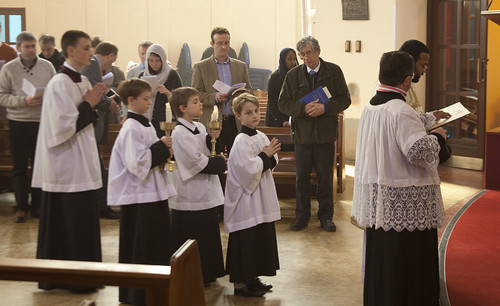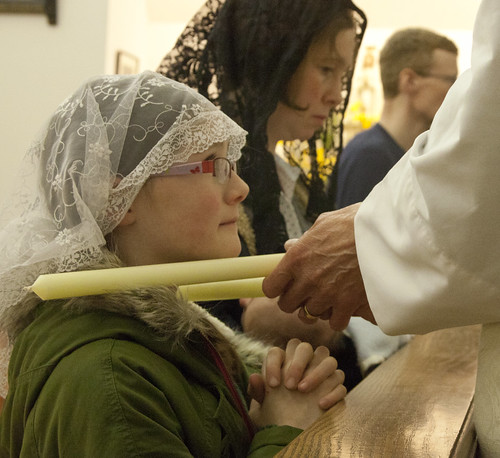Chairman's Blog
A footnote on Freemasonry
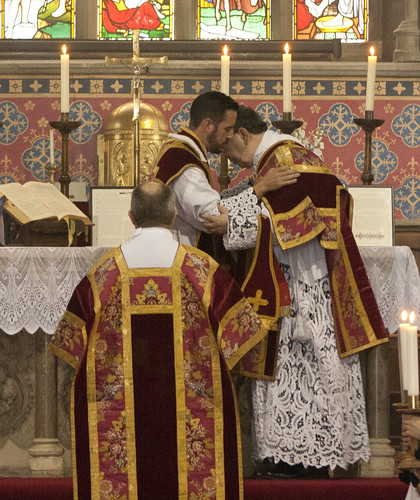 |
| One of my favourite liturigical rituals, and one of the most dramatic and expressive: the kiss of peace at High mass. |
Further to my post on Freemasonry here, a comment left on my FB page is worth reproducing, from a mason.
Most Freemasons of my acquaintance are traditionalists in the sense that they value and appreciate traditional values, especially morality, so might there not be scope for traditional Catholics and Freemasons to be allies in the fight against the advance of inappropriate modernism? We could still agree to disagree on details of doctrine (Freemasonry is not, and does not claim to be, a religion).
In light of the Church's condemnations, the prospect seems a dim one. Perhaps Freemasonry may be a promising field for evangelisation. However, my experience of people who regard themselves as guardians of 'traditional values' outside the Church is that there is usually a lot less to this than meets the eye. A classic position of liberal elites shoring up the established order is trying to stop people not-like-us reproducing: the poor, the stupid, members of less favoured ethnic groups. I wonder what masons think about issues like that. Maybe they'll tell me in the combox.
All the same, the last word should go to Walton Hannah.
In general, Freemasonry is Scotland is more popular and relatively far more numerous than in England, partly because it tends to be cheaper, and because austere Presbyterianism has eliminated most of the colour, glamour, and ceremonial from Christian worship. When the soul is starved of these elements in religion, it will naturally tend to compensate for them itself in less desirable ways. It is not only the hostility of Rome that has left Masonry weak in Catholic countries.
Darkness Visible pp257-8.
Support the work of the LMS by becoming an 'Anniversary Supporter'.
A note on Freemasonry
 Since Freemasonry is regarded as significant by Pope Francis, as well as many previous popes and in various private revelations by the Blessed Virgin Mary, I thought I'd try to educate myself a little about it. I can't say I've come to any very exciting conclusions, but I can recommend a couple of books, and make a few observations.
Since Freemasonry is regarded as significant by Pope Francis, as well as many previous popes and in various private revelations by the Blessed Virgin Mary, I thought I'd try to educate myself a little about it. I can't say I've come to any very exciting conclusions, but I can recommend a couple of books, and make a few observations.
My interest has been in the philosophy (or religion, or ideology) of Freemasonry, as opposed to the extent it has, or fails to have, influence in local or world events. The second subject is one where reliable information is obviously going to pretty difficult to find, and I think that Freemasonic influence over the Church, specifically, is going to be of importance only if it is connected with a philosophy which is opposed to the Church's teaching. Many dubious people have had undue influence over the Church locally, or in Rome, over the centuries, but if what they are after is money or prestige then the damage they do to the Church, while real, is at least comprehensible and repairable. The ultimate threat to the Church, against which Christ has given his ultimate guarantee, is not prelatial nephews spending the revenues of dioceses they never visit on wine, women and song, or criminal gangs arranging flamboyant funerals for deceased mobsters, disedifying though these are, but the Church ceasing to proclaim the Gospel because of the influence of an alien ideology.
So here are a couple of books. The classic study of British Freemasonry is Darkness Visible by Walton Hannah, first published in 1952. An excellent recent account is Masonry Unmasked by John Salza (2006), from an American perspective. The aim of each of these books is the same: to demonstrate, from the rituals used by Freemasons, that it has philosophical and religious claims which are incompatible with orthodox Christianity.
Hannah wrote his book as an Anglican cleric, at a time when several Anglican bishops were masons. They managed to prevent any official investigation or discussion of the subject, but the book's exposure of the issues brought a gradual end to the era of such close entanglement between Masonry and the Established Church. Nevertheless, Hannah later became a Catholic and a priest. Salza was a Catholic who became a mason after being told that there was nothing much wrong with it, for a Catholic; he found out more, as a mason, and realised that there was, and left it. Freemasonry is a religious system incompatible with Christianity; if most masons don't take this system very seriously, there is even less reason to commit oneself to it formally. As Hannah points out, the make-believe quality of the oaths and rituals, if that is going to be the defence, only serves to emphasise that in taking them one is guilty of the sin of rash swearing. But as a matter of fact there are masonic writers whose mystical interpretations of the rituals are the same of writers like Hannah and Salza.
The Masonic religio-philosophical system is, in a nutshell, that all religions are equally valid: members can swear their oaths on any holy text they like. Historically, the inspiration for the moral ideas and rituals comes from Christianity, with a bit of made-up ancient Egyptian mysticism. But Freemasonry also claims to have 'secrets' and a method of instruction which makes its members into an enlightened elite.
In this, Freemasonry is a fully-worked out example of Enlightenment liberalism, plus rituals, role-playing amateur dramatics, and silly handshakes. Liberals looks down at the world's religions and say, first, that they are all equally valid, and then, in the next breath, that they themselves have transcended such footling divisions. To say all religions are equally true is, of course, equivalent to saying that all are equally false, and it is not so surprising to find that the great division in the world of Freemasonry is between officially theistic masonry - the 'Grand Lodge' Masonry of the English-speaking world - and non-theistic and in practice anti-clerical masonry - the 'Grand Orient' Masonry of the Continent. The split occurred at the beginning of the 19th century, when the Grand Orient lodges rejected belief in God as an essential qualification for masons.
It is sometimes said by British masons that Catholic condemnations of Freemasonry refer to anti-clerical and historically anti-ancien regime Grand Orient masonry, not the kind which can happily include among its members British Kings and an Archbishop of Canterbury. However, as Hannah points out, this is not so, since many such condemnations date from before the split, and even later ones note religious indifferentism as a major issue, a criticism which ceases to be applicable when you tip over the edge into atheism. In fact the condemnations apply to both kinds, and to their many splinter-groups. It is enough to point out that they deny the unique significance of the Christian revelation, engage in unjust or at best rash swearing, and, despite official denials, seek to establish obligations which supersede those of Church and State.
Hannah gives a nice illustration of this. When looking into Freemasonry, he wrote, as an Anglican in orders, to bishops who where known to be masons, asking them for guidance as to how he should address the concerns of members of his flock about Freemasonry. They replied that they were not at liberty to discuss the matter. In other words, their masonic obligations took precedence over their episcopal obligation to provide guidance to those under their charge. This is the more remarkable in that the typical response of Anglican clerical masons to criticisms was to play down the reality of masonic obligations and the importance of the 'secrets': which had, after all, been published by masonic publishers, in easily decipherable code, for many years, accompanied by numerous exposes even before Hannah's supremely systematic and accurate one.
The situation is richly absurd, in that everyone can pore over masonic rituals, read masonic interpretations of them, and have a public debate on the subject, except the masons themselves, who, in Hannah's day and (I get the impression) today also, remain on the sidelines bleating feebly that it is all harmless fun but they can't go into details.
The question then is: when (for example) Our Lady of Good Success in Quito warns of the influence of masons, when Popes up to and including Pope Francis warn about 'Masonic lobbies', what exactly are we being warned against? It might seem unfair to point the finger at a dwindling British band of rather conservative, establishment types, who may give each other preferential treatment in dubious ways but hardly seem a threat to world peace. But actually, I think the fact that Anglicanism was riddled with Freemasonry at the eve of the great cultural and moral crisis of the 20th century does help explain why it collapsed so quickly and so completely: it didn't really believe in itself. Again, the fact that significant numbers of establishment types are still consoling themselves with 18th century allegorical morality tales of supreme superficiality, instead of either doing anything about public culture or availing themselves of the graces available from Our Lord and Saviour, helps explain why the 'small-c' conservative response to the continuing decay of this country is so consistently flaccid.
So I think the poison of religious indifferentism is at least part of what is being warned against. Today we see religious indifferentism raised to the level of a sort of official religion, in schools and in governments, both local and central. One may say that Freemasonry has triumphed, even if as an institution it has seen better days. If indifferentism, or indifferentism which has evolved into practical atheism, is a motive force for organised campaigning groups, whether these groups be derived from formal Freemasonry or not, one may, again, say that the spirit of Freemasonry is active in them. And indeed such groups exist within the Church, and it makes little difference whether they identify with Freemasonry or not: what matters is what they believe, and the effect they are having.
 It is obvious that you can't proclaim the Gospel unless you believe in it. If you think that the Gospel is no better than any other religion, and that you and your enlightened friends can look at all these belief systems from a great, patronising height, then you don't believe in the Gospel. To that extent that this attitude permeates the Church, the Freemasons have won.
It is obvious that you can't proclaim the Gospel unless you believe in it. If you think that the Gospel is no better than any other religion, and that you and your enlightened friends can look at all these belief systems from a great, patronising height, then you don't believe in the Gospel. To that extent that this attitude permeates the Church, the Freemasons have won.
Maybe it is actual, professed masons doing the bad things in the Church; if so, we'll probably never know. What we do know is how to oppose the errors of their ideology: with the truth of the Gospel.
Support the work of the LMS by becoming an 'Anniversary Supporter'.
Will Pope Francis come after the Traditional Mass?
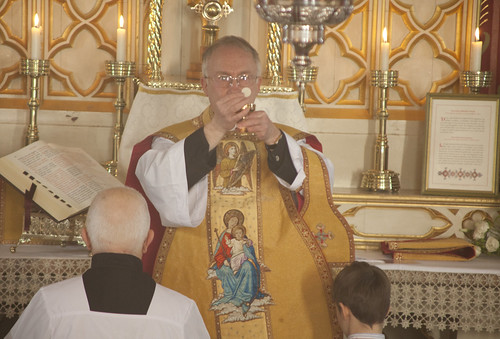 |
| A recent Missa Cantata in Holy Trinity, Hethe, in Oxfordshire. |
Having seen this story on Rorate Caeli and elsewhere, my own feeling, which I concede is very fallible and certainly isn't based on any very special intelligence gathered in Rome, is that Pope Francis isn't going suddenly to open up another front in the conflict he is currently engaged in. I don't see why that would make sense to him, at this point.
In brief, the story is that Archbishop Arthur Roche, formerly the bishop of Leeds in England and now the Secretary of the Congregation for Divine Worship under Cardinal Sarah, has been charged with working to undermine in some way what was one of the key documents of the conservative counter-offensive in Rome, which took place from the mid-1990s to the end of Pope Benedict's pontificate: Liturgiam authenticam, an Instruction of the Congregation for Divine Worship published in 2001. This document is about the principles which should inform liturgical translations, and it completely overturned the consensus which had governed the dreadful translations of the 1970s, by saying that liturgical texts should aim not only for easy comprehensibility, but for accuracy, plus an elevated style which evokes the idea that one is engaged in a holy action. (Take note, Neil Addison, who never tires of criticising the LMS translation of the Ordinary of the Mass for doing exactly this. That's the price of fidelity to the living magisterium I suppose.) Unusually, Liturgiam authenticam not only supercedes but explicitely abrogates earlier documents about translations, which did not say this (for a flavour of those, see this):
|
8. The norms set forth in this Instruction are to be substituted for all norms previously published on the matter, with the exception of the Instruction Varietates legitimae (1994) ...
|
Another factor is that Archbishop Roche was very much involved in the last English translation, and it would be a bit strange - not impossible, of course, people can change their minds - for him to set about destroying his own work.
And finally, Archbishop Roche is only the Secretary of the Congregation, and a new document against the Benedictine reforms, coming through the CDW, is hardly going to happen while Cardinal Sarah is in charge. Pope Francis could remove Sarah at any time, but up to now he has not done so, and whatever reasons he may have had for appointing him (quite recently, of course) seem still to be valid.
I am also sceptical about the idea that Pope Francis will go after the Traditional Mass after saying so often that he has no intention of doing so, and of making such concessions to the SSPX.
I think these sorts of stories come from people around Pope Francis who would like them to be true, perhaps even with a view to menacing potentially awkward people into quiescence. But the Pope has, in his confusing way, been quite consistent about his programme, and is now very deeply involved in the effort to make it work, against notable opposition. His programme is about making concessions, whether rhetorical or substantive, to divorcees and others living on the margins of the Church. He has never shown any great interest in the liturgy, and celebrates ad orientem as well as versus populum in the Sistine Chapel.
Nevertheless, it is never a bad time to think about what we can do to be ready for any attack on the Traditional liturgy. One thing I have been doing with the Position Papers is trying to show how that liturgy can be of real value to the Church, in the proclamation of the Gospel in Africa, in China, to men, and to children. The list is not going to stop there. This is one way to counter the idea that the Traditional Mass can or should be confined to any kind of ghetto.
Support the work of the LMS by becoming an 'Anniversary Supporter'.
Epiphany in Oxford: photos
The celebrant was Fr John Saward, Priest in Charge at SS Gregory & Augustine's. We always have candles all round the church for Epiphany.
The Schola Abelis was led by Dominic Bevan.
Support the work of the LMS by becoming an 'Anniversary Supporter'.
Mass for St Hilary in the Dominican Rite, Oxford: 14th Jan
The Schola Abelis will be learning to sing the Dominican chants for the feast, which are slightly different from those in the Roman books. The Dominicans want to celebrate this as a High Mass, with deacon and subdeacon, so it will be a splendid Mass. If you can make it, please come along to honour the great St Hilary, who has given his name to Oxford's spring term, the term which starts on the very next day.
Support the work of the LMS by becoming an 'Anniversary Supporter'.
2017 Wall Calendars still available from the LMS
Now that you've remembered that you forgot to get one of these, you still can! Yours for £7 from the LMS website here.
It opens up to a list of dates arranged vertically, giving you much more space than in the usual formats to write things in, with our lovely photos arranged down the left.
Support the work of the LMS by becoming an 'Anniversary Supporter'.
LMS vs. CTS Ordinary Booklet: the translation
The Catholic Truth Society boasts that the translation they include in their booklet of the Ordinary of the Mass is a newly commissioned one. This is a good thing, for many translations in old hand missals are not very good - surprisingly enough, from the era when a good number of Catholics would have had the Latin to notice errors and infelicities, at least so one would imagine.
I think it would be a good thing if Catholics could get into serious discussions about the meaning of Latin words, so I am going to do a little digging. The CTS translation is not too dreadful, but - obviously - the LMS one is far superior. (Buy it from the LMS website.)
There are certain words and passages which can serve as a litmus test of liturgical translations. Does it translate 'hostia' as 'host', or 'sacrifice', or correctly, as 'victim'? Does it refer to Abraham as a Father or Patriarch, as the Latin does, or find some mealy-mouthed substitute? Does it cut out the poetic adjectives which adorn the Institution Narrative: accipiens et hunc praeclarem calicum in sanctas ac venerabiles manus suas?
I am happy to say that the CTS translation passes these tests: 'old ICEL' (1974) did not. ('He took the cup.' Words fail me.)
It is at a slightly more subtle level that the CTS translation is deficient: and I am afraid the deficiency is a real one. It is evident to me, not a great Latinist by any means, but, like many Catholics, someone who can look from the Latin page to the English one and see what is being translated, that the translation is just consistently, well, a bit lame.
How do you translate that amazing word, tabernaculum? It was 'tabernacles' which St Peter proposed to build on the mountain of the transfiguration, and translators have rendered it as 'booths' and 'tents', but clearly this is a word freighted with significance. It is tabernacles which feature in the Feast of Tabernacles: 'Feast of Tents' hardly captures the idea. And the word and the concept have been adopted for the dwelling of Our Lord in the Blessed Sacrament in our churches. It appears in the Psalm Judica: 'unto thy Holy Mountain and unto thy Tabernacles'. The CTS gives 'tents'. Lame. The LMS has 'tabernacles'.
What of the Canon? Prayer for the living: pro se suisque omnibus: literally, 'for them and for all their own', the LMS conveys the sense with 'for themselves and all who are dear to them'; the CTS has 'for themselves, for their families and friends'. As well as suggesting that the Latin says things it simply does not say, don't you think this lacks dignity? It is lame.
What of the 'locum refrigerii', which we pray for, for the dead? The LMS captures the idea, born in hot countries no doubt, of the cool and quiet of heaven, with 'place of refreshment'. The CTS has 'a place of respite.' Seriously lame.
How about 'Hanc igitur oblationem'? The LMS gives us 'this oblation'; the CTS 'this offering'. Now that is really lame. An oblation is more than just an offering. It always reminds of me of Martin Luther saying that the Canon 'stinks of oblation'. Well, the CTS version doesn't: at least, not so powerfully.
It ought to smell to high heaven: like at the Offertory, where the CTS tells us that it should 'rise up with a pleasing fragrance before your divine majesty'. But the LMS has 'ascend in the sight of thy divine majesty with an odour of sweetness.' Who could not prefer the LMS version, especially when it is evident that it is closer to the Latin? The CTS just gives up the unequal struggle to find a translation of 'in conspectu divinae maiestatis tuae.'
The fact is that the Latin is flowery. If you don't like it, find some other religion: these are among the most ancient liturgical texts which exist in the Church. It is flowery, repetitive, poetic, and larded with foreign, exotic, and archaic vocabulary (by the standards of its own day). It needs to be translated in a way which is faithful to these realities. That is why the LMS has used 'thee' and 'thou', which the CTS has not had the courage to embrace, which are rather less archaic to us than 'quaesumus' was to Romans in the 4th century.
Translating is difficult, and I don't want to be too harsh on the anonymous translator who struggled over these texts for the CTS. I am sure he was poorly paid. But readers of this blog can do better. They can buy themselves the LMS booklet. It can be purchased from the LMS website.
Support the work of the LMS by becoming an 'Anniversary Supporter'.
EF Ordinary Booklet: LMS vs. CTS
 |
| Ever mindful of feedback, we will be using this slightly revised, less cluttered cover when the booklet is reprinted. The contents will also have some tiny, and I mean tiny, corrections. |
One of the reasons we at the Latin Mass Society created a booklet of the Ordinary of the Mass was because the widely-used red 'Booklet Missal' produced by the Coalition in Support of Ecclesia Dei is American and contains some American feasures, such as the American version of the Prayer to St Michael. We also thought we could do better in certain ways.
While we were still thinking about this, the Catholic Truth Society brought one out. That is a good thing; it is good that the the CTS is using its considerable market penetration to spread knowledge about the Traditional Mass, in a handy pocket format with a smart leatherette cover. The only problem is that this booklet contains a series of mistakes.
A second edition was published, and I thought they might address some of these, but in fact the only difference, as far as I can see, is the title: it is now called 'The Extraordinary Form of the Mass' instead of 'The Traditional Latin Mass'.
So what are these mistakes?
First, there are a series of misdirections as to who is saying what.
At the Pater Noster (the Our Father, before Communion) it directs 'S', the server, to say the it up to and including 'et ne nos inducas in tentationem', when it says 'S/C' (Server or Choir) to say 'Sed libera nos a malo', adding 'This is sung at High Mass'.
This makes no sense at all. The Pater Noster is never said by the Server, but the Server (or the choir) responds 'Sed libera nos a malo'.
 |
| Some bright spark at the CTS objected to their title 'The Traditional Latin Mass'. Fine, but what about the mistakes? |
It is true that there is an obscure option for the congregation to say or sing the Pater Noster, among the many complicated options for dialogue Masses given in 1958. But the point of this, of course, is that it is said by the congregation, not the Server. Directing the Server to say it is simply wrong. And anyway, the CTS booklet hasn't gone into all the other complicated options, which are never used in England. I suspect the confusion here has come from practice at the Novus Ordo.
A different kind of confusion is at work in the Agnus Dei, where the book tells us that it is
 |
| One of the illustrations in the LMS book. |
One of the strangest things in the booklet is that it tells us that 'Prayer for the Dead is sometimes added' to the Prayers after Low Mass, giving the text of the De Profundis. I have never encountered this, and it is not in the Ritus Servandus. If it is done, it would be a private initiative of the priest. It is extremely strange to print it in a tiny book to help people follow Mass.
 |
| Another illustration. |
The Latin Mass Society's booklet has a huge amount of additional material, including beautifully printed chant notation and prayers for Holy Communion, and it can be purchased from the LMS website (or your friendly local church) for the extremely reasonable £3.75, with a stiff colour cover. There are discounts for bulk orders.
The leatherette CTS booklet will set you back £5.95; they also do a version in the format of one of their information booklets, for £2.50, but if you want something small and cheap, you can get one of the little blue booklets from the LMS for £1.50.
Support the work of the LMS by becoming an 'Anniversary Supporter'.
If the good guys win at the Synod
I first published this in October 2015. Events seem to have upheld my pessimism.
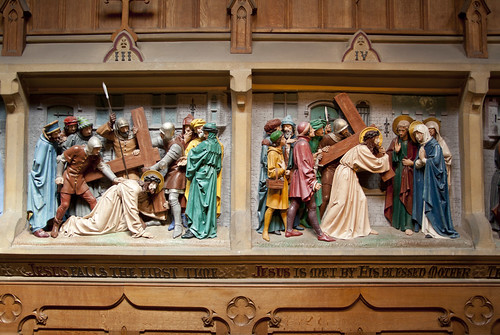 |
| The Third Station: Jesus Falls the First Time. The Fourth Station: Jesus is met by His Blessed Mother |
I wasn't around for the Second Vatican Council and its immediate aftermath, but on the basis of what I've read about those years, I feel as if I am watching an action-replay.
One thing to remember about it is that the terrible things which happened after the Council came after the promulgation of documents which had been much tweaked in a conservative direction, documents which the more conservative bishops felt they could, after all, support, since they were quite capable of being read in a way consistent with traditional views. For example, it was quite late in the proceedings that one famous sentence of the document on liturgy, Sacrosanctum Concilium, assumed its final form:
'there must be no innovations unless the good of the Church genuinely and certainly requires them'
with the addition of the phrase 'genuinly and certainly', 'vera et certa'. With this in the document, what more could anyone ask?
One thing we have to understand is the way liberals read documents. Their scriptural exegesis illustrates the point. They don't read a whole passage or letter or whatever and come to a balanced view of what points are being made there - that would be boring. Instead, they take a bit they like, and instead of reading it in the context of the rest, they use it as an 'interpretive key' of the rest: they read, or ignore, the rest of the document through that one passage. Usually it is an isolated sentence, or even a stray phrase. Thus, they see St Paul's words 'there is neither Jew nor Greek, neither male nor female', (Galatians 3:28), and instead of asking what, in context, he meant by that, they take it as meaning what they want it to mean, which today is something approaching gender theory, and proceed to interpret, or ignore, everything else St Paul wrote to fit their weird understanding of that one phrase. So despite everything St Paul says, at length and with great emphasis, about the differences between the sexes, liberals will quote this phrase to show that female ordination is demanded by Scripture. Nothing else St Paul wrote makes any difference, because it all needs to be understood through this 'key'.
The 'Spirit of Vatican II' works in a similar way. The argument here is that, again looking at an isolated passage in a particular document, the Council moved the Church from being in favour (for example) of traditional religious dress with all the trimmings, or a completely Latin liturgy, to the point at which we are asked to consider if all the trimmings are appropriate to modern conditions, or to consider the use of the vernacular for some parts of the Mass. What we need to take from the Council, the liberals claimed, is not the document's final, stated, position - habits and Latin should emphatically be retained - but the direction of movement. It is therefore a matter of 'obedience to the Council' to continue that movement: it is obedient to the Council, in fact, to violate the Council's clear words, and jettison habits, and Latin, altogether. To insist on what the Council actually said is to disobey the Council.
Conservatives were at a huge disadvantage in debating the meaning of such texts with liberals, because they wanted to adopt a balanced and docile position which drew from the documents whatever might be of value in them. They felt obliged to go along with a huge amount of very disruptive and damaging changes in the hope that they would have good results - which of course they might have had, at least in many cases, if they had stopped there - which merely conceded to the liberals a good half of what they wanted. It was then far harder to resist the further changes which the liberals undertook under cover of the confusion and controversy. The conservatives did the liberals' work for them by overcoming the inertia inherant in any stable institution, getting the ball rolling, by an often ham-fisted authoritarianism.
With hindsight, it would have been better to say that, since the Council's comments on these and many other matters were nothing more than recommendations on matters of prudential judgement, the vast can of worms they offered to open should remain closed until a more auspicious moment presented itself.
With the Synod on the Family, that won't be an option in the same way, but the liberals' ability to snatch victory from the jaws of stalemate is undiminished. The very fact that the issues are being debated is a huge gain for the liberal side of the argument. The very fact that certain frankly disedifying statements from the bishops' interventions are being quoted in the press - accurately or not - moves the debate immeasurably in their favour.
I read today that one bishop thought the 'language of indissolubility' needs to be changed. Words fail me. That this should be said at a Synod in Rome undermines the certainty of doctrine which has, on this topic, survived in the public perception of the Church. That certainty, in public perception, is of immense value. Take that away, and all hell breaks loose.
If the good guys win at the Synod, the liberals will still win. If the good guys clearly and publicly lose, then the results will immediate and catastrophic. I expect, however, that some formula will be found to maintain a consensus, a formula which could be seen as a victory for the conservatives, at least by comparison with the demands of some of the liberals. The point is, this will still be a victory for the liberals. They will take the concessions made to them, they will act as if they won twice as much, and they will be back for more.
I don't believe in an inevitable victory for the liberal side of the debate in the long term - quite the contrary - but the Synod, like Vatican II, has brought together a balance of forces which is clearly not going to conclude with a triumphant reassertion of the traditional view. Things are going to get worse, a lot worse, before they get better.
Support the work of the LMS by becoming an 'Anniversary Supporter'.
Children and the Traditional Mass
In the pause between Christmas and the New Year, on the feast of the Holy Innocents, I invite a little reflection on children and the liturgy.
I have written a few posts about this already on this blog, and the current issue of the Catholic Herald has a short piece by me on this topic. But today I am publishing a Position Paper about it on Rorate Caeli go there to read it.
People who have never attended the Traditional Mass can still be found who assume that the only people there are old folks who can remember it from the 1950s. The image of young people--perhaps 'rigid' young people--associated with it has, however, begun to impinge on the consciousness of the wider world, and the mental readjustment this has necessitated has been painful to watch. The Holy Father has repeatedly said that he finds it difficult to understand, and he is certainly not alone. Another step again is required to absord the fact that in many places the Traditional Mass is filled with children, who seem perfectly contented with it, in fact rather less bored than children at the Ordinary Form can often be, despite the attempts being made to entertain them.
If you find this difficult to understand, you may need to let go of some prejudices before it begins to make sense, and it is for the sake of my more baffled readers, or the baffled people my readers meet, that I have been banging on about this subject. What I want to convey to them can be summarised in a few common-sense ideas.
1. Modern entertainment, education, and liturgy directed at children tries to keep their attention by frequent change, by keeping things familiar and easy to digest, and by a mockery of the old order: gender models, hierachy, traditional narrative structures, doctrines and so on. The last element is part of a 'dumbing down' process but often comes across as baffling to children, who don't have an articulated grasp of what is being rejected, so can't see how clever or funny their entertainers, teachers, and children's-liturgy-coordinators think they are being. The overall effect is one of banality, which is exremely boring, especially for children who are (mentally) six months older than the intended audience, for whom it comes across as acutely patronising.
2. Traditional entertainment, education, and liturgy for children (as for anyone) invites you into something which you do not already understand. If that thing is of real value, then this invitation is intriguing, and the things you see and hear seem to be, what they are: filled with profound, though not immediately clear, meaning. This is fascinating for children: you can see them absorbed by it. They don't understand everything straight away, but children's whole lives are like that, and they have a way of engaging with things at their own level. Repeated experiences of the same thing, or type of thing, enable them to penetrate to greater and greater depths.
The Traditional Mass is an example of the second type of thing. And you know what? It works. It doesn't make children morally and spiritually perfect right away--of course not--but as they grow older and more familiar they can become absorbed by it for stretches of time as they are with stories and plays and traditional games. Being absorbed by the liturgy is what we all want, isn't it? Because the liturgy is the source and summit of the Christian life: so says Vatican II.
But oh no! the liberals say: even if children are absorbed by the vestments and the incense and the music they don't really understand it, as they would a Novus Ordo celebration done specially for children in words of one syllable, and surely it is understanding which is the important thing. After all, liturgy is not about entertainment, is it?
This objection rests on a couple of mistakes. The first is the idea that children, particularly small children, understand the baby-talk of the Eucharistic Prayers for children. I'm afraid children simply aren't going to take in such big blocks of texts; no educationalist would imagine that this is a way to get children to understand anything. Catechesis may enable them to grasp what is going on, but that is going to be true regardless of the liturgy. Our question is what the liturgy can itself contribute.
The other mistake is in imagining that a child's engagement with the ancient liturgy should not be described as 'understanding'. What children can understand in the Traditional Mass is that there is something of tremendous holiness and grandeur taking place; this is something children at a liberal ideal liturgy would be forgiven for missing completely. And if you don't understand that, then you really have missed the whole point.
The liturgical reform was focused on verbal communication, and it is natural for its supporters to look at verbal comprehension to measure its success. But a child who can parrot back to his teachers that at Mass 'we remember that Jesus had a meal with his friends' has not, simply by that fact, understood the Mass. A child who has a developed an instinct to kneel and be quiet, because what is happening up there in the sanctuary is beautiful and set apart from ordinary life, has, on the other hand, grasped something fundamental, and is in an infinitely more receptive frame of mind to benefit spiritually from the experience, and to absorb appropriate catechesis, than a child who can do no more than trot out a simplistic verbal formula.
It is interesting to see that a traditional conception of children's Catholic education is not, after all, limited to learning the Penny Catechism by rote. Such learning makes sense, in fact, in the context of the training of the emotions, the mind, the spirit, by the liturgy. The Penny Catechism can attach pithy verbal labels to experiences which are, in fact, incommunicable. The labels are helpful, indeed indispensible, but they certainly aren't the whole story.
'Suffer the little children to come to Me', says Our Lord. And when they come to Him, what does He do? Does He tell them simple stories about kindness to animals and tolerance to people of other faiths? No. Does He give them a lecture, in words of one syllable, about theology? No. He embraces them and blesses them (Mark 10:16). In other words, He shows them natural affection, and He subjects them to an objectively efficacious ritual. Parents and Pastors have something to learn from this.
Support the work of the LMS by becoming an 'Anniversary Supporter'.

